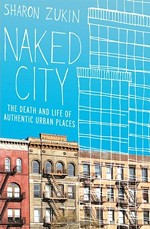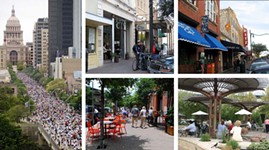Point Austin: A Tale of Two Cities
Double vision on affordable housing
By Michael King, Fri., July 4, 2008

Last week I attended the grand opening of Skyline Terrace, Foundation Communities' latest low-income housing project, on Ben White near South First. The former motel, with a fairly rough history and reputation, has been transformed into a 100-unit efficiency apartment building providing modest, comfortable, and supportive housing for residents earning less than $24,900 annually (50% of the local median family income); most earn less than $15,000. This marks the third such successful project for the housing and social-service nonprofit – meaning about 350 people who would otherwise be living in borrowed digs, temporary shelters, their cars, or simply on the street now have a real, affordable place to stay; a permanent address; and a hand up to the next stage of their lives. Overall Foundation Communities has placed roughly 2,000 low-income families in apartment or duplex homes – a real record of achievement.
A couple of hundred people heard FC Executive Director Walter Moreau thank funders, architects, planners, staff members, and neighbors for staying the course for Skyline Terrace. There were a couple of moments in planning, he said, when it seemed the project simply could not survive, and the reconstruction process (complete with a plague of mold) had its own setbacks. But the result is a visible credit to everyone involved, including all Austinites, since $7 million of our $55 million in voter-approved affordable-housing bonds helped underwrite the project. "Austin voters decided to raise all our taxes just a little bit to help address the need for housing in our community," Mayor Will Wynn said proudly at the occasion. "It's the first time that voters in Texas have approved general obligation bonds for affordable housing."
The immediate neighborhood was represented this day by Carol Gibbs of the South Lamar Neighborhood Association, who told me later that Moreau and his staff "did a wonderful job" of engaging interested neighbors early on, answering all their questions, and involving them in the plans (indeed, Skyline Terrace may become the new site of SLNA meetings). Gibbs said that while there had been some neighborhood opposition, it was largely based on misinformation about the project or about the "homeless," and in the end, the association voted "overwhelmingly" in favor of the project.
All Around the Town
I note that outcome because in recent months my own neighborhood – Windsor Park – has been embroiled in a controversy over an affordable-housing project, proposed by the Community Partnership for the Homeless for a tract on Manor Road. The Partnership wants to build (from scratch) a 110-unit complex, aimed at a similar population as Skyline Terrace: low-income, single adults in need of low rents and supportive services (partly provided on site). Foundation Communities has consulted on the work, but this is the first project on this scale for the Partnership, which has been providing smaller-scale affordable housing since 1990.
After initial, tentative support, the Windsor Park Neighborhood Association more recently voted nearly unanimously against the project. "The neighborhood definitely supports affordable housing," WPNA President Rodney Ahart told me. "We just don't believe that this location, with this amount of density, is the right place for it." Although the project (proposed for a currently vacant, 5-acre piece of private land) would front on a commercial corridor, it would back on single-family homes, and despite the willingness of the Partnership to adjust the construction footprint accordingly, the nearest property owners remain unpersuaded and have petitioned the City Council against the project. Ahart suggested the developers look across Manor Road to rehab decrepit apartment buildings nearby, but Partnership Executive Director Frank Fernandez says those buildings are neither financially nor physically practical for this purpose.
But the pragmatic arguments for and against have steadily been overwhelmed by larger, much more emotional ones: whether Windsor Park and the Eastside already have "more than our fair share" of low-income housing, halfway houses, shelters, and the like, so they should "put it on the west side." Fernandez points out that there are plenty of deep-pocketed developers eager to spend big money on private west-side projects; nonprofits like the Partnership can hardly compete in that land rush. Another problem with this Eastside/west-side argument is that the people making it are, like myself, mostly (de facto) gentrifying homeowners riding the wave of inner-city property appreciation. Our claims to historical "Eastside" street credentials – that is, mostly minority and low-income people and mostly renters of increasingly nonaffordable housing – are pretty damn thin. Moreover, an anti-"homeless hotel" hysteria, dismally caricaturing the prospective project tenants, has been fueled by an astroturf propaganda campaign partly funded by nearby business owners whose low-wage employees (in yet another irony) would quite likely benefit from projects like this one.
Meet the Neighbors
There are roughly 19,000 people in Windsor Park. According to Fernandez, among us are 2,000 households whose members qualify financially for the housing he wants to build. My guess is that estimate is low. But in any case, of a couple of hundred listed members, a few dozen of us homeowners in the WPNA are now the "neighborhood" voting to oppose this project, while the people most in need of it are largely invisible in such public policy debates. "The people who attend these neighborhood meetings," said Fernandez, "are not the folks who need this housing and these services."
Although some of my neighbors, alas, can sometimes sound like they've watched way too many Law & Order reruns, I can see both sides of this particular argument. Austin remains "two cities" – although not as racially or economically segregated as it once was – and residents of both live increasingly side by side. Whether it's the best of times or the worst of times depends largely on where you're standing. Although the Manor Road project is not precisely in accord with the "neighborhood plan," it's a reasonable bet that it would in fact be a step toward renewal and stability for a blighted block, as well as providing a practical supply of desperately needed housing – which is what the Planning Commission considered when it voted last month to recommend the project to the council, scheduled to consider it this month or next.
I have no idea whether it can win the supermajority on the new council it will need to survive in this location, especially in the current atmosphere of official obeisance to "the neighborhoods." I do hope that whatever they decide, council members will at least consider the broadest possible definitions of "neighbors," "neighborhood," and "community."
Got something to say on the subject? Send a letter to the editor.












